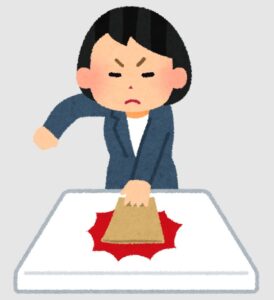管理人オススメコンテンツはこちら
「金融リテラシーを持ってないヤツがカモられる|年利2%が解けない国ニッポン」
〜前回のつづき〜
●こんなにヤバい!日本人の金融リテラシー(つづき)
【Q1】家計管理
家計の行動に関する記述のうち
適切でないものはどれか?(5択問題)
a)家計簿などで収支管理する
b)本当に必要か、収入はあるかなどを考えた上で買うかどうかを決める
c)収入のうち一定額を天引きするなどして貯蓄する
d)支払いを遅らせるためクレジットカードの分割払いを多用する
e)わからない
〜・〜・〜・〜
正解→ d)支払いを遅らせるためクレジットカードの分割払いを多用する
クレジットカードの
分割払いというのは
高金利の借金と変わらないからです。
この問題の正解率は55%でした。
クレジットカードの分割払いが
高金利の借金だと知らずに使ってる人が
半数近くもいるという事になるんですね。
確かに
リボ払いの悪夢を知らない人が
結構いるんですよね。
私のまわりでも結構いました。
リボ払いは一体何がダメなのか?
というのは過去にもお話ししてます。
↓
最初は小さい金額から
スタートする人が多かったり
クレジットカードの支払い方法が
勝手にリボ払いになってる事が有るので
注意が必要です。
私の場合は
銀行のキャッシュカードに付随している
クレジット機能は軒並みそうでした。
今使っている銀行に連絡して
リボ機能は外してもらいましたが
気づかなかったら
エライ事になっていました。
【Q2】金融取引
100万円を年率2%の利息が付く
預金口座に貯金した場合
この口座への入金や
出金が無かった場合
1年後に口座残高はいくらになるか?
利息にかかる税金は
考慮しないものとする。
(3択問題)
a)102万円
b)102万円以外
c)わからない
〜・〜・〜・〜
正解→ a)102万円
100万円預けて
2%金利が付くという事なので
2万円増えて
口座残高は102万円になる
という事です。
これも正答率が
まさかの68%なんですね。
100万円を年率2%で運用した時の
利息を計算出来ないという人が
3人に1人いる訳ですね。
利息計算というのは
あまり馴染みが無かったら
意外に高度な事なのかもしれないですね。
習ってなかったら
なかなか仕方がない
という所なんですけどね。
そして先程の問題の
続きを見てみたいんですけど
ここまでは
答えられたという人は
いると思うんですね。
〜〜〜つづく〜〜〜
Special Thanks college president Ryo.
●おまけ
≪≪perplexityちゃんによる文章まとめ≫≫
日本人の金融リテラシーの低さが問題視されています。
家計管理に関する設問では、「支払いを遅らせるためクレジットカードの分割払いを多用する」という行動が不適切とされていますが、正答率は55%と約半数がリスクを理解していません。
分割払いやリボ払いは高金利の借金と同じで、家計に大きな負担を与えるため注意が必要です。
また、100万円を年利2%で運用した場合の利息計算問題でも、正答率は68%にとどまり、3人に1人は正しく計算できませんでした。
これらの結果から、日常生活での金融知識の不足が明らかになっています。
金融教育の機会を増やし、正しい知識を身につけることが今後ますます重要になるでしょう。
[1] https://green-osaka.com/sh-knowhow/saimuseiri/disadvantages-of-credit-card-installment-payments.html
[2] https://www.early-cross.com/column/4984/
[3] https://spaceshipearth.jp/financial-literacy/
[4] https://www.orixbank.co.jp/column/article/027/
[5] https://www.gov-online.go.jp/useful/article/201404/1.html
[6] https://www.legalsmart.jp/knowledge/debt-workout/other-debt-workout/19203/
[7] https://www.iyobank.co.jp/sp/iyomemo/entry/20231228.html
[8] https://www.gunmabank.co.jp/kojin/kariru/koza/koza2.html
≪≪Chat-GPTくんによる英訳≫≫
~Continuation from the previous post~~
【It’s This Bad?! Financial Literacy in Japan (continued)】
—
[Q1] Household Budgeting
Which of the following actions related to household budgeting is not appropriate? (Choose one from five options)
a) Managing income and expenses using a household ledger or similar method
b) Deciding whether to make a purchase based on necessity and available income
c) Automatically saving a portion of income through deductions, etc.
d) Frequently using credit card installment payments to delay payments
e) I don’t know
—
Correct Answer → d) Frequently using credit card installment payments to delay payments
Because credit card installment payments are essentially high-interest debt.
The correct answer rate for this question was 55%.
That means nearly half of people are using credit card installment plans without realizing they are high-interest loans.
It’s true—many people are still unaware of the dangers of revolving credit (revo-bara).
I’ve seen quite a few people like that around me, too.
I’ve talked before about what makes revolving credit so problematic.
See:
#17 The Structure of Credit and the Nightmare of Revolving Payments ~~Part 1~~
Many people start using it with only small amounts at first.
Also, in some cases, the credit card payment method is automatically set to revolving credit without your knowledge, so you have to be careful.
In my case, credit card functions attached to my bank’s cash card were mostly like that.
I had to contact my bank and ask them to disable the revolving payment feature.
If I hadn’t noticed, it could have been a serious problem.
—
[Q2] Financial Transactions
Suppose you deposit 1,000,000 yen in a savings account with an annual interest rate of 2%.
If there are no additional deposits or withdrawals during the year,
how much will the account balance be after one year?
(Assume interest tax is not applied.)
(Choose one from three options)
a) 1,020,000 yen
b) An amount other than 1,020,000 yen
c) I don’t know
—
Correct Answer → a) 1,020,000 yen
If you deposit 1,000,000 yen at an interest rate of 2%,
it will earn 20,000 yen in interest,
so the account balance will become 1,020,000 yen.
Even so, the correct answer rate was only 68%.
That means 1 in 3 people cannot calculate the interest earned from investing 1,000,000 yen at an annual rate of 2%.
Interest calculation might feel surprisingly complex
if you’re not familiar with it.
And if you were never taught it in the first place,
it’s kind of understandable.
Now, let’s take a look at the next part of the previous question.
I think there were at least some people
who were able to answer up to this point.
Special Thanks OpenAI and Perplexity AI, Inc








